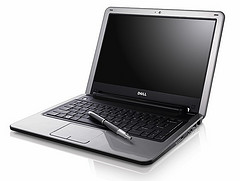 The proliferation of affordable netbooks is good for everyone – consumers, that is. Computer manufacturers loath it (high volume, low margin business) and so does Microsoft: they can’t exactly sell $100+ worth of software on a $200 machine. So they come up with all sorts of evil plans.
The proliferation of affordable netbooks is good for everyone – consumers, that is. Computer manufacturers loath it (high volume, low margin business) and so does Microsoft: they can’t exactly sell $100+ worth of software on a $200 machine. So they come up with all sorts of evil plans. 

$279 Fully Configured Acer Aspire One Notebook – Real or Scam?
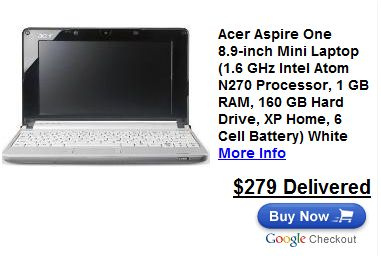 I know netbook prices are dropping, but not this fast! Just a day after hearing about a $309 deal here’s an ad for a higher-end Acer Aspire One, for $279, shipping included!
I know netbook prices are dropping, but not this fast! Just a day after hearing about a $309 deal here’s an ad for a higher-end Acer Aspire One, for $279, shipping included!
The lowest price for this configuration so far has been on Amazon, @ $399.
I am speechless… this looks too good to be true. I can’t find any info on the vendor (BeneficialTech.info), there is a contact email but no phone number – – but they have Google Checkout.
So I leave it to my dear readers to decide: do you think this is real or a scam? 
Related articles by Zemanta
- Get an Acer Aspire One netbook for $309 shipped
- Four million EEE PCs have been sold
- Asus Netbook Reaches 4MB In Sales
- Asus makes Eee PC S101 official, expects warm reception
- The One Thing the ASUS CEO did Not Get Right | $279 Acer Aspire One?


MyGallons.com Update – Is it Over?
 Just ten days ago I reported on MyGallons.com, a service that would allow consumers to hedge against future gas price increases. Several things, including the business model and the founder’s background just “didn’t click”, so I was suspicious:
Just ten days ago I reported on MyGallons.com, a service that would allow consumers to hedge against future gas price increases. Several things, including the business model and the founder’s background just “didn’t click”, so I was suspicious:
The story may just be coming to an end. Several Floria papers, including the Miami Herald, which gave an initial glowing review now report that MyGallons.com is refunding their 6 thousand customers’ money.
But is this really the end of the story? The company’s website (nofollow) has been revamped. During the controversy they provided news updates on the frontpage, trying to explain why they did not have a payment processor..etc. Now all that’s gone, previous news items have been deleted, and – surprise! (not really) – the signup link is still active.
I hope nobody gets fooled into signing up…
Related articles by Zemanta

MyGallons.com – I Smell Something, and it Ain’t Gasoline
 I can’t believe all the positive reviews of MyGallons on decent blogs with sizeable readership… have we all become so naive as to believe anything that promises relief from the gasoline squeeze?
I can’t believe all the positive reviews of MyGallons on decent blogs with sizeable readership… have we all become so naive as to believe anything that promises relief from the gasoline squeeze?
At least Mashable is doubtful, and Autoblog warns it may be a scam. So what’s this all about?
A newly launched service that allows you to prepay for gas at today’s prices, then fill up your car using the MyGallons debit card at your locked-in price. You pay an annual membership fee ranging between $30-$40, and $1.95 every time you reload the card.
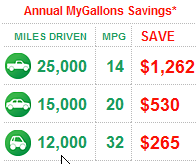 Jeff Nolan looks at how this might (or not) work from the consumer / small business side, and concludes:
Jeff Nolan looks at how this might (or not) work from the consumer / small business side, and concludes:
For this to work for consumers the bar is steep. First and foremost, you have to consume enough fuel to make the incremental cost savings exceed the fees you are paying, and because the savings you can achieve are a function of the time between when you load the card and then use it, well you have to pre-purchase a hell of a lot of fuel to get to the point where the price differential naturally widens.
I’m more in the other side, how is this to become a sustainable business? After all, you’re locked-in price and debit card is only worth anything as long as the company that backs it up is still in business.
I could see the model work in a “normal” fluctuating market, where the price fluctuation, along with the membership fees and one-time charges all work out to the company’s benefit. But in the current market with steadily climbing prices, their core business, “betting” on the gas price is a losing proposition, except for the membership fees, so they need a lot of longevity to stay solvent until they see gas prices decline. They are either “loaded” and have huge credit, which I doubt, or will have to be very smart putting the upfront customer payments to work: they have to find very lucrative short-term investments that grow faster than the gasoline index.
And when they see relief – i.e. gas prices start to drop – they will profit on existing deposits, but it’s also the end game: new deposits will dry up, as they have no business model for a declining market (customers can’t short the market).
But that’s long-term speculation, let’s focus on the immediate issues. MyGallons does not have a banking partner payment network to support their debit cards. The Launch press release stated a week ago:
…the gas redemption program uses the Voyager fleet network, owned by US Bank, which is accepted at over 95% of gas stations nationwide.
As it turns out, they were only in negotiations with US Bank, which decided to pull out. For this very reason the Better Business Bureau assigned MyGallons an F, their worst rating. Not having a financial network has not stopped MyGallons from signing up new users, in fact, according to Founder, President Steve Verona, over 6,000 signed up in the first week. Will the company be able to issue the debit cards? The promise 4-6 weeks delivery, so that buys them some time. The information on the website is still misleading:
MyGallons has learned that its prior vendor, GoGas Fleet, the reselling partner for US Bank’s Voyager Network, is no longer able to honor our agreement [ there was no agreement! ] to provide its services to our members. MyGallons is currently in negotiations to team with one of the competing national payment networks to support our exciting program to ease the pain of rising gas prices.
Talk about Mr. Verona, different sources know his background quite differently. The Miami Herald, his home paper:
“A former consultant for technology companies, Verona has been trading commodities and currencies since he was 13.”
The Los Angeles Times:
Verona, 39, has been involved in a string of companies including DB Net Ventures Inc. in Upper Darby, Pa.; Jewish Jeans Clothing in Columbus, Ohio; and an online store called Pursue Peace Clothing. Verona confirmed that he filed for personal bankruptcy in Ohio in 2001.
Oh, well, at least he gas relevant experience: bankruptcy proceedings.
Related articles by Zemanta

The Shareware Awards Scam
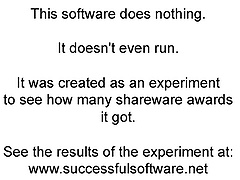 This is just hilarious: Andy Brice, a UK-based software developer started to get suspicious about the high number of awards displayed on software download sites, so he created a little experiment.
This is just hilarious: Andy Brice, a UK-based software developer started to get suspicious about the high number of awards displayed on software download sites, so he created a little experiment.
He created a new “product”: a text file with the words ” this program does nothing at all ” repeated a few times and then renamed as an .exe. He even declared the same on the screenprint submitted to shareware sites. That was not enough to prevent several sites from awarding him with “5 stars”. Apparently these awards are handed out left and right, hoping that subitters would display the badges with a backlink to the originating site. Andy’s conclusion:
The truth is that many download sites are just electronic dung heaps, using fake awards, dubious SEO and content misappropriated from PAD files in a pathetic attempt to make a few dollars from Google Adwords.
Here’s the collection of awards awardmestars.exe “earned” so far:
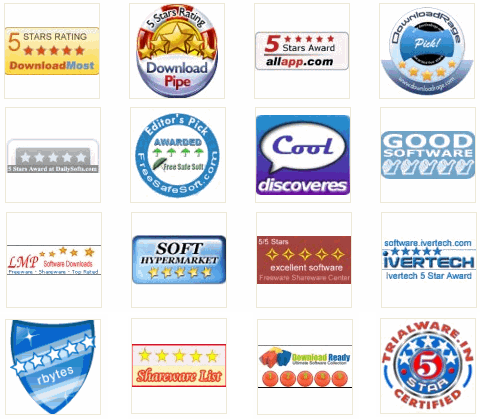
16 and counting. Well, perhaps it stops now, that Andy “outed” himself. Or who knows, given the attention level site owners demonstrated, they hardly read blogs.
Next time you download unknown shareware, you may want to think of just how safe it could be – apparently ratings mean nothing.
Additional reading: Google Blogoscoped, JD on EP , Christopher Null , Things That, Global Nerdy.


Recent Comments